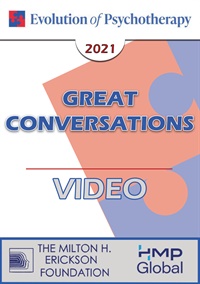
- Average Rating:
- Not yet rated
- Topic Areas:
- Depression | Great Conversations
- Categories:
- Evolution of Psychotherapy | Evolution of Psychotherapy 2021
- Faculty:
- Michael Yapko, PhD | David Burns, MD
- Course Levels:
- Master Degree or Higher in Health-Related Field
- Duration:
- 1 hour
- Format:
- Audio and Video
- Original Program Date:
- Dec 02, 2021
- Short Description:
- Even before the onset of the COVID-19 pandemic, depression was already ranked by the World Health Organization (WHO) as the number one cause of human suffering and disability. The pandemic caused a huge spike in rates of depression giving rise to serious questions about the way we think about depression. Is it primarily a neurochemical phenomenon? Is it a product of environmental and situational influences? Or both? This conversation will explore these questions and others as well.
- Price:
- $59.00 - Base Price
Tags: Depression
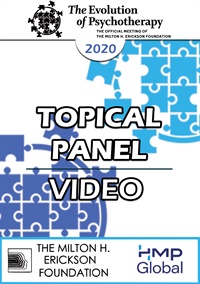
- Average Rating:
- Not yet rated
- Topic Areas:
- Depression | Topical Panels
- Categories:
- Evolution of Psychotherapy | Evolution of Psychotherapy 2020
- Faculty:
- Michael Yapko, PhD | Christine Padesky, PhD | Bill O'Hanlon, MS
- Course Levels:
- Master Degree or Higher in Health-Related Field
- Duration:
- 34 minutes
- Format:
- Audio and Video
- Original Program Date:
- Dec 12, 2020
- Short Description:
- Depression is one of the most common problems brought to psychotherapists. Treatment options and biological substrates will be discussed.
- Price:
-
Sale is $29.00
price reduced from Base Price - $59.00
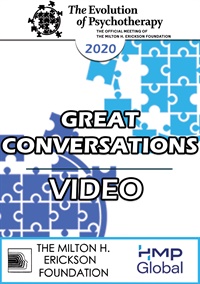
- Average Rating:
- Not yet rated
- Topic Areas:
- Depression | Great Conversations | Psychopharmacology | Psychotherapy
- Bundle:
- EP20 Highlights
- Categories:
- Evolution of Psychotherapy | Evolution of Psychotherapy 2020
- Faculty:
- Michael Yapko, PhD | Erving Polster, PhD
- Course Levels:
- Master Degree or Higher in Health-Related Field
- Duration:
- 1 hour
- Format:
- Audio and Video
- Original Program Date:
- Dec 11, 2020
- Short Description:
- Major Depressive Disorder (MDD) is the most common mood disorder on earth and earlier this year was ranked as the number one cause of suffering and disability worldwide by the World Health Organization (WHO). Depression is a complex, multi-faceted disorder and many different theories have been formulated to describe its etiology and course. In this joint presentation, Drs. Polster and Yapko will compare and contrast their viewpoints about depression, the liberal use antidepressant medications, and why good psychotherapy is more important than ever.
- Price:
-
Sale is $29.00
price reduced from Base Price - $59.00
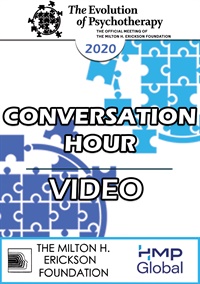
- Average Rating:
- Not yet rated
- Topic Areas:
- Cognitive Behavior Therapy (CBT) | Conversation Hours | Depression
- Categories:
- Evolution of Psychotherapy | Evolution of Psychotherapy 2020
- Faculty:
- David Burns, MD
- Course Levels:
- Master Degree or Higher in Health-Related Field
- Duration:
- 1 hour 01 minutes
- Format:
- Audio and Video
- Original Program Date:
- Dec 10, 2020
- Short Description:
- Dr. Burns’ new book, Feeling Great, is based on 40 years of research on how this cognitive therapy actually works, and more than 40,000 hours of therapy with depressed and anxious individuals, and includes powerful new tools to melt away therapeutic “resistance.” This opens the door to ultra-rapid treatment for the first time.
- Price:
-
Sale is $29.00
price reduced from Base Price - $59.00
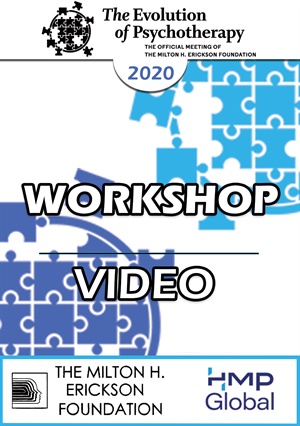
- Average Rating:
- Not yet rated
- Topic Areas:
- Depression | Workshops | Cognitive Behavior Therapy (CBT)
- Bundle:
- EP20 Highlights
- Categories:
- Evolution of Psychotherapy | Evolution of Psychotherapy 2020
- Faculty:
- David Burns, MD
- Course Levels:
- Master Degree or Higher in Health-Related Field
- Duration:
- 1 hour 49 minutes
- Format:
- Audio and Video
- Original Program Date:
- Dec 09, 2020
- Short Description:
- Research indicates that therapeutic failure nearly always results from patient resistance that hasn’t been addressed. In this workshop, you will learn how to bring subconscious resistance to conscious awareness and melt it away quickly for faster, better outcomes. Prepare to explore a revolutionary new approach based on the paradoxical premise that depression does not result from what’s wrong with you, but from what’s right with you.
- Price:
-
Sale is $29.00
price reduced from Base Price - $59.00
Tags: EP20 Highlight
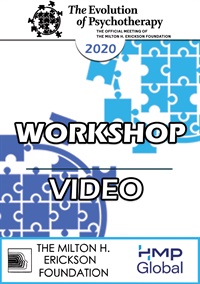
- Average Rating:
- Not yet rated
- Topic Areas:
- Depression | Workshops | Grief | Suicide
- Categories:
- Evolution of Psychotherapy | Evolution of Psychotherapy 2020
- Faculty:
- Donald Meichenbaum, PhD
- Course Levels:
- Master Degree or Higher in Health-Related Field
- Duration:
- 2 hours
- Format:
- Audio and Video
- Original Program Date:
- Dec 09, 2020
- Short Description:
- Contemporary minority professionals, with college degrees, positions in higher education, private practitioners, and other workspaces, often encounter dilemmas about their lack of advancement or self-efficacy. The within-group diversity among these women requires a cultural competency mindset, one that engages clients from a strength versus deficit or stereotyped-based perspective. In this workshop, participants will engage in activities to foster social identity examination as a bridge to recognizing the Latina social identities paradigm. Dilemmas that emerge because of the Maria Paradox messages, sexualized societal attitudes about Latinas, and “presumed incompetence” will be examined. Participants will leave with a guide for empowering professionals through solution-oriented culture-centered psychotherapy practices.
- Price:
-
Sale is $29.00
price reduced from Base Price - $59.00
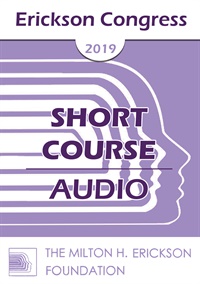
- Average Rating:
- Not yet rated
- Topic Areas:
- Short Courses | Anxiety | Depression | Ericksonian Hypnosis and Therapy Techniques | Children and Adolescent Therapy | Eye Movement Desensitization and Reprocessing (EMDR) | Hypnosis | Cognitive Behavior Therapy (CBT)
- Categories:
- Erickson Congress | Erickson Congress 2019
- Faculty:
- Joseph Sestito, MSSA, LISW-S
- Duration:
- 1 Hour 33 Minutes
- Format:
- Audio Only
- Original Program Date:
- Dec 12, 2019
- Short Description:
- The first factor that is of central importance is developing a strong therapeutic alliance with the client, mainly through empathically relating to him/her. Second, it will be shown how to guide adolescents and younger children to identify the specific Activating Event (AE) that is bringing about their unhealthy negative emotions through triggering self-defeating cognition(s).
- Price:
- $15.00 - Base Price
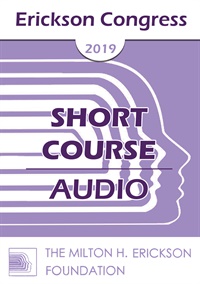
- Average Rating:
- Not yet rated
- Topic Areas:
- Short Courses | Anxiety | Communication | Depression | Neurobiology
- Categories:
- Erickson Congress | Erickson Congress 2019
- Faculty:
- Bart Walsh, MSW
- Duration:
- 1 Hour 29 Minutes
- Format:
- Audio Only
- Original Program Date:
- Dec 12, 2019
- Short Description:
- Chronic anxiety and depression present significant challenges for those affected by these conditions. A behavioral treatment which accesses deep levels of mind-body functioning facilitates remission of these debilitating conditions. This treatment, conceptualized as essential neurobiological communication (ENBC), incorporates a form of body language known as ideomotor signaling.
- Price:
- $15.00 - Base Price
Tags: Anxiety Depression Neurobiology
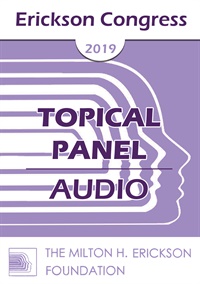
- Average Rating:
- Not yet rated
- Topic Areas:
- Workshops | Dialectic Behavior Therapy (DBT) | Interviewing | Motivation | Cancer | Depression | Resistance
- Categories:
- Erickson Congress | Erickson Congress 2019
- Faculty:
- Neil Fiore, PhD
- Duration:
- 1 Hour 54 Minutes
- Format:
- Audio Only
- Original Program Date:
- Dec 12, 2019
- Short Description:
- Training cancer patients in Stress Management and Dialectic Behavior Therapy methods to challenge worries, ineffective self-management, and ambivalence, using Motivational Interviewing:
- Price:
- $15.00 - Base Price
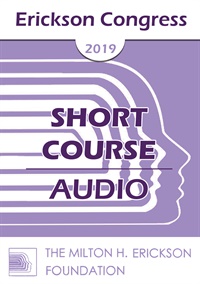
- Average Rating:
- Not yet rated
- Topic Areas:
- Short Courses | Depression | Trauma | Seeding | Therapeutic Relationship
- Categories:
- Erickson Congress | Erickson Congress 2019
- Faculty:
- Robert Wubbolding, EdD
- Duration:
- 1 Hour 24 Minutes
- Format:
- Audio Only
- Original Program Date:
- Dec 12, 2019
- Short Description:
- The American novelist William Faulkner stated, "The Past is never dead. In fact, it is not even past." This presentation emphasizes the unconventional use of reality therapy that connects the past with the presents by helping clients realize that their current behaviors are normal responses to abnormal situations that they have experienced. It also operationalizes the Ericksonian principle: "The solution often appears unrelated to the problem."
- Price:
- $15.00 - Base Price
Please wait ...

